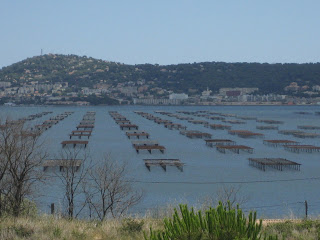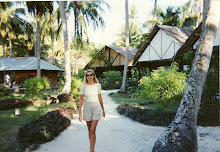I learnt a couple of things last weekend. One was the origin of the word barbecue. The other was the origin of Marcel Pagnol's family. (Author of Jean de Florette, Manon des Sources et al.)
In the 17th century, when French pirates set off to conquer the Caribbean, among them were Breton and Norman sailors. They had a habit of roasting whole animals over wood fires and took the practice with them. They would eat the entire animal, from its head to its tail, and referred to this way of eating as de la barbe à la queue. In the Caribbean, the saying was shortened to something approximating barbecue.
I read this in a book in a wood cabanon by the beach at Frontignan, near Sète, in the Languedoc. Picking up another book I read that Pagnol is derived from les Espagnols. Obvious once you see it. Pagnol's family originated in Spain.
The reason I mention those two snippets is because they reflect the pleasure of lazing by a wooden chalet at the beach, in the sun, in summer. You lie on the grass, pick up a glass of cold rosé, pick up a book, and browse casually.
The chalet belongs to friends who are kind enough to let us use it when weather permits. It's been in Jean's family for three generations, handed from father to son, and is a step back from the beach in a restful tangle of oliviers de Bohème, flowering oleanders, tamarisks, palms and fig trees. It's a small wooden construction with tropical-looking lattice-work which is actually traditional to the Midi coastline.
Though it's set on a small private pathway, along with newer buildings, no-one bothers about the fact that families trundle by every day in July and August, lugging deckchairs, children and picnics. It's a shortcut to the beach and the rusted sign saying Propriété privéé has long ago been pushed to one side and forgotten.
Arriving at the chalet is like an instant stress cure. Calm and relaxation flood over you as you open the gates and walk in. Inside, we found the usual tangle of cobwebs and leggy spiders spiralling away into corners as daylight spilled in. The spiders' webs drift down like super-fine fishing nets as you move around, or, invisible, take you by surprise when you walk into them face-first.
In the weeks or months when the chalet lies unused, ants and other creatures are the only residents. Little heaps of sawdust lie around where the beams have been burrowed into.
Naturally the old hoover doesn't work, so we sweep up and then lug the furniture out onto the wooden terrace. With the water and electricity turned on, everything's ready for the weekend.
The first evening, we dine Chez la Tchepe, a little restaurant on the edge of the Etang de Thau. It offers no-frills simplicity and a counter full of super-fresh coquillage, notably the renowned oysters of Bouzigues which have been hoisted up from the waters we're looking at.
We ask for a local Picpoul - Duc de Morny - but it isn't sold here so we select another. But as Morny is particularly light and fresh, we decide to go to the vineyard in the morning and buy some. Our meal of tielles, oysters, mussels, crevettes, violets, lemon, bread and butter and a bottle of Picpoul comes to 33 euros and we head back to the chalet full of good food and fresh sea air.
When we find the vineyard in the morning, we ask the owner why we never see his Picpoul in the shops. He shrugs and says he doesn't need to market it. He has private clients who order it each year, so he sells other cuvées to distributors, those which are less popular or made in greater volume. He has a few cases of 6 bottles left though so we snap one up for 24 euros. So do another couple who are here for exactly the same reason.
In the evening - 14th July, so a French national celebration - we head along to Frontignan where a local version of water jousting, in gondolas, is taking place. Two teams row past each other with a sturdy young man on each boat and the jousters attempt to push each other in the water. There's also a boat with a band playing trumpets and banging drums and a boat detailed to pick up the guys who get pushed into the water. There's lots of music and cheering and fooling around and the two teams each have their own supporters on opposite sides of the narrow sea inlet. The climax to the event is a spectacular display of fireworks which finished with an effect I hadn't seen before. It's a series of huge fireworks which appear to come ever nearer to you so that the last one seems to be bearing down right on the crowd. After the fireworks, an open-air concert and a dance start up, with an elaborate fair to entertain children.
Sunday is quieter. We drive to Marseillane, a pretty port, and have lunch by the water. The drive back takes us around the Etang with its waters shining in the sunlight. After a dip in the sea and a tidy round the chalet we head back to the Vaucluse. Frontignan and Sète have little in common with the Cote d'Azur. There's no glitz and no jet set. There's a different character altogether and one that takes time to appreciate maybe. The old wooden chalets which have all but disappeared deserve some recognition really and I mentioned to one of the friends who owns this one that it would be good to make a film about them. There must be a lot of stories behind those which have not been demolished and the land sold to make money on new villas. Joelle's a film maker and she agreed but is doubtful that a distributor would pick up on the idea.
But never mind. It's enough to experience the place. The structure and atmosphere, the sunlight and shade, and most important perhaps the sea air make it a blissful break. A lovely place.
**********************
Don't be the last person to read Present Tense. Buy it now:
Saturday, July 21, 2012
Subscribe to:
Post Comments (Atom)






Si vous souhaitez créer une entreprise à Singapour, nous vous recommandons de consulter ce site internet (http://www.healyconsultants.com/) et de nous contacter. Bien cordialement.
ReplyDelete